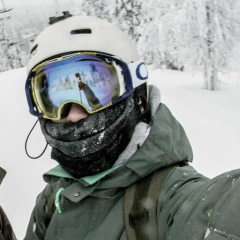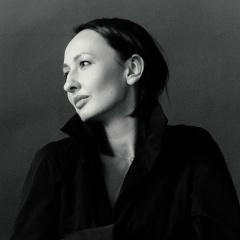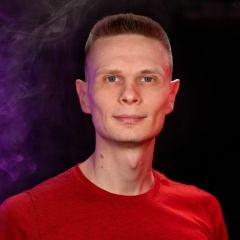Бар ж/д вокзала «Новосибирск-Главный», буфетчица советского типа, 2 бокала «Балтики 7» по 0,5 (потому что стаканов 0,3 в баре нет). Скоро Новый год – вот и гирлянды поблёскивают, вот и Путин в стоящем на стойке телевизоре затянул свою уходящую в бесконечность прямую с ходоками и журналистами. Молодые люди с Балтикой довольно громко обсуждают судьбу простого человека, которому не повезло жить в великое время. «Чтобы определить, нужно ли удирать уже сегодня или еще можно будет удрать завтра, требуется столько же интеллектуальных усилий, сколько лет двадцать-тридцать назад хватило бы на создание гениального труда». Думается, во всех барах страны во время прямой линии президента можно услышать похожие разговоры, только вот вокруг столов этого заведения стеной стоят люди в наушниках, щелкают затворы фотоаппаратов и колышутся микрофоны. Диалог за Балтикой прерывается одним из посетителей бара, который врывается в дискуссию о месте человека в истории репликой: «А я блять не хочу участвовать в вашем спектакле! Я что, не личность, что ли?». Это – живая иллюстрация поднятых в пьесе Бертольда Брехта вопросов соотношения воли и счастья, границах свободы и, конечно, физически воплощенная актуализация спектакля, подаренная режиссеру судьбой в виде брутального мужчины и небольшого риска для здоровья. Актуализация хороша в меру, поэтому, не развивая конфликт, спектакль сворачивается и вместе со зрителями перемещается к новогодней ёлке, оставив свободолюбивую личность с Путиным.
Спектакль «Разговоры беженцев» поставлен режиссером Константином Учителем по пьесе Брехта на Ленинградском вокзале как проект фестиваля «Точка доступа», а в Новосибирск привезен в рамках Рождественского фестиваля, обжившись на главном вокзале города. Эта единственная иммерсивная работа программы хорошо демонстрирует особенности жанра незнакомым с ним сибирякам. На входе на вокзал зрители получают комплект оборудования, который позволяет слушать не только разговоры героев, но и музыку, дополняющую действие. «Разговоры беженцев» обозначен как променад-спектакль, и ходить приходится немало, накручивая круги по вокзалу вслед за персонажами. Вокзал в этот момент живёт как обычно – зрители рассаживаются в зале ожидания между спящими пассажирами, девочками в спортивных олимпийках «Russia» (привет, Звягинцев!) и людьми в форме. Дисклеймер для всех, кто планирует посетить этот или другой любой подобный спектакль – очень важно воспринимать всё происходящее частью одного с текстом смысла, и тогда удовольствие будет необыкновенным, а спектакль расширится до пределов примерно вселенной. Например, когда наши обсуждающие Гитлера герои заходят в кинозал, а там показывают Чаплина – это, конечно, длинная рука демиурга-Учителя, который заделал для нас красивых ходов. А вот когда один из персонажей произносит оду удобной обуви, с обладанием которой мало что в жизни может сравниться, а в ряду напротив женщина устало растирает ноги в расстёгнутых (и никак не сшитых на заказ) сапогах – это рука уже какого-то другого демиурга и очень хорошо.
Пьеса «Разговоры беженцев» написана Брехтом в 1944 году, и наполнена рассуждениями о свободе, судьбе, маленьких людях, великих нациях и том, как нам выжить среди всей этой грешной любви. Проводить аналогии между современной Россией и тоталитарными махинами, описанными в пьесе, даже не хочется – с этим справится, в общем, даже тот зритель, который никогда не увидит спектакль и не прочитает пьесу. А вот то, как воздействует этот театр на зрителя, кажется очень интересным. Поскольку помимо глаз и ушей зрителя режиссеру отдается и все остальное тело, он, конечно, этим пользуется. «Посидеть и посмеяться» перемежается с «походить по лесенкам и послушать Баха», а после кинематографичного финала, где герои уходят по пустынному перрону в закат, зрителей заставляют бодренько маршировать под немецкий марш. И нельзя сказать, что «здесь всё, как в реальности». Здесь, напротив, работает принудительная театрализация всего и вся. Герои при помощи микрофонов разговаривают друг с другом, даже находясь в разных концах зала, сочувственно говорят случайным свидетелям «нам, к сожалению, всё-таки придется доиграть спектакль» и разъясняют «да это ж Брехт, классика!», а то и вовсе напрямую обращаются к зрителям «Ну вы поняли, да, что я актёр?». Зрители при этом оказываются частью спектакля не только путем втягивания в разговоры беженцев-актёров, но и просто вызывая волнение и ажиотаж среди пассажиров своим странным видом и кучкованием. И пассажиры. Именно это почувствовал и необычайно точно выразил наш герой из бара – они здесь, конечно, актеры, создатели и кто угодно ещё. Именно они придают постановке объём и краски, за что им и спасибо.
Приходя в зал, внимательный зритель включает сенсоры на максимум, чтобы не пропустить, что там нам опять хотел сказать художник. Аналогичным образом включив сенсоры в пространстве вокзала, мне, признаться, было уже непросто выключить их, к примеру, в метро. Не это имел в виду Уильям наш Шекспир, когда писал про мир-театр и прочее, но ему бы, кажется, понравилось.
#разговорыбеженцев #мрфи #xmasfest #театрглобус
Спектакль «Разговоры беженцев» поставлен режиссером Константином Учителем по пьесе Брехта на Ленинградском вокзале как проект фестиваля «Точка доступа», а в Новосибирск привезен в рамках Рождественского фестиваля, обжившись на главном вокзале города. Эта единственная иммерсивная работа программы хорошо демонстрирует особенности жанра незнакомым с ним сибирякам. На входе на вокзал зрители получают комплект оборудования, который позволяет слушать не только разговоры героев, но и музыку, дополняющую действие. «Разговоры беженцев» обозначен как променад-спектакль, и ходить приходится немало, накручивая круги по вокзалу вслед за персонажами. Вокзал в этот момент живёт как обычно – зрители рассаживаются в зале ожидания между спящими пассажирами, девочками в спортивных олимпийках «Russia» (привет, Звягинцев!) и людьми в форме. Дисклеймер для всех, кто планирует посетить этот или другой любой подобный спектакль – очень важно воспринимать всё происходящее частью одного с текстом смысла, и тогда удовольствие будет необыкновенным, а спектакль расширится до пределов примерно вселенной. Например, когда наши обсуждающие Гитлера герои заходят в кинозал, а там показывают Чаплина – это, конечно, длинная рука демиурга-Учителя, который заделал для нас красивых ходов. А вот когда один из персонажей произносит оду удобной обуви, с обладанием которой мало что в жизни может сравниться, а в ряду напротив женщина устало растирает ноги в расстёгнутых (и никак не сшитых на заказ) сапогах – это рука уже какого-то другого демиурга и очень хорошо.
Пьеса «Разговоры беженцев» написана Брехтом в 1944 году, и наполнена рассуждениями о свободе, судьбе, маленьких людях, великих нациях и том, как нам выжить среди всей этой грешной любви. Проводить аналогии между современной Россией и тоталитарными махинами, описанными в пьесе, даже не хочется – с этим справится, в общем, даже тот зритель, который никогда не увидит спектакль и не прочитает пьесу. А вот то, как воздействует этот театр на зрителя, кажется очень интересным. Поскольку помимо глаз и ушей зрителя режиссеру отдается и все остальное тело, он, конечно, этим пользуется. «Посидеть и посмеяться» перемежается с «походить по лесенкам и послушать Баха», а после кинематографичного финала, где герои уходят по пустынному перрону в закат, зрителей заставляют бодренько маршировать под немецкий марш. И нельзя сказать, что «здесь всё, как в реальности». Здесь, напротив, работает принудительная театрализация всего и вся. Герои при помощи микрофонов разговаривают друг с другом, даже находясь в разных концах зала, сочувственно говорят случайным свидетелям «нам, к сожалению, всё-таки придется доиграть спектакль» и разъясняют «да это ж Брехт, классика!», а то и вовсе напрямую обращаются к зрителям «Ну вы поняли, да, что я актёр?». Зрители при этом оказываются частью спектакля не только путем втягивания в разговоры беженцев-актёров, но и просто вызывая волнение и ажиотаж среди пассажиров своим странным видом и кучкованием. И пассажиры. Именно это почувствовал и необычайно точно выразил наш герой из бара – они здесь, конечно, актеры, создатели и кто угодно ещё. Именно они придают постановке объём и краски, за что им и спасибо.
Приходя в зал, внимательный зритель включает сенсоры на максимум, чтобы не пропустить, что там нам опять хотел сказать художник. Аналогичным образом включив сенсоры в пространстве вокзала, мне, признаться, было уже непросто выключить их, к примеру, в метро. Не это имел в виду Уильям наш Шекспир, когда писал про мир-театр и прочее, но ему бы, кажется, понравилось.
#разговорыбеженцев #мрфи #xmasfest #театрглобус
The bar of the Novosibirsk-Glavny railway station station, a Soviet-style barmaid, 2 glasses of Baltika 7 0.5 each (because there are no 0.3 glasses in the bar). Soon the New Year - that’s where the garlands sparkle, and here Putin, in the TV on the stand, pulled his straight line going to infinity with walkers and journalists. Young people with the Baltic discuss quite loudly the fate of a simple man who was unlucky to live in a great time. "To determine whether to flee today or still be able to flee tomorrow, it takes as much intellectual effort as twenty or thirty years ago would be enough to create brilliant work." It seems that in all bars of the country during the president’s direct line you can hear similar conversations, only around the tables of this institution people are standing in the headphones, clicking on the shutters of cameras and swaying microphones. The dialogue outside the Baltic is interrupted by one of the visitors to the bar, who breaks into the discussion about a person’s place in history with a remark: “I don’t want to take part in your performance! Am I not a person, or what? ” This is a living illustration of the questions of the relationship between will and happiness raised in the play of Bertold Brecht, the boundaries of freedom and, of course, the physically embodied actualization of the performance, presented to the director by fate in the form of a brutal man and a small health risk. Actualization is good in moderation, therefore, without developing a conflict, the play is minimized and, together with the audience, moves to the New Year tree, leaving a freedom-loving person with Putin.
The play “Conversations of Refugees” was staged by director Konstantin Uchitel based on Brecht’s play at Leningradsky Train Station as a project of the “Access Point” festival, and was brought to Novosibirsk as part of the Christmas Festival, having settled down at the city’s main station. This only immersive work of the program well demonstrates the features of the genre to Siberians unfamiliar with it. At the entrance to the station, viewers receive a set of equipment that allows you to listen to not only the conversations of the heroes, but also music that complements the action. “Refugee Conversations” is designated as a promenade-performance, and you have to walk a lot, twisting circles around the station after the characters. The train station at this moment lives as usual - the audience is seated in the waiting room between sleeping passengers, girls in the “Russia” sports olympics (hi, Zvyagintsev!) And people in uniform. Disclaimer for everyone who plans to attend this or any other similar performance - it is very important to perceive everything that is happening as part of the meaning of the text, and then the pleasure will be extraordinary, and the performance will expand to the limits of about the universe. For example, when our heroes discussing Hitler go to the cinema, and there they show Chaplin - this, of course, is the long arm of the demiurge-Teacher, who patched up beautiful moves for us. But when one of the characters pronounces an ode to comfortable shoes, which possesses little in life, and in a row opposite, a woman wears her feet tiredly in unbuttoned (and by no means custom-made) boots - this is the hand of some other demiurge and very well.
The play “Conversations of Refugees” was written by Brecht in 1944, and is filled with discussions about freedom, fate, little people, great nations and how we can survive in the midst of all this sinful love. I don’t even want to draw analogies between modern Russia and the totalitarian maxims described in the play - in general, even the viewer who will never see the play and read the play will cope with it. But the way this theater affects the viewer seems very interesting. Since in addition to the eyes and ears of the viewer, the director is given the rest of the body, he, of course, takes advantage of this. “Sit and laugh” is interspersed with “walk the ladders and listen to Bach,” and after the cinematic finale, where the characters leave on a deserted platform in the sunset, the audience is forced to march cheerfully to the German march. And you can’t say that "everything is here, as in reality." Here, on the contrary, forced theatricalization of everything and everyone works. The heroes use microphones to talk to each other, even while being in different parts of the hall, sympathetically tell random witnesses “we, unfortunately, still have to finish the play” and explain “yes this is Brecht, classic!”, Or even directly appeal to the audience "Well, you understand, yes, that I am an actor?". At the same time, the audience turns out to be part of the performance not only by drawing refugee actors into conversation, but also simply causing excitement and excitement among passengers with their strange appearance and bunching. And the passengers. This is what our hero from the bar felt and unusually accurately expressed - they are, of course, actors, creators and anyone else. It is they who give volume and color to the production, for which I thank them.
Coming into the hall, the attentive viewer turns on the sensors to the maximum so as not to miss what the artist wanted to tell us again. In a similar way, turning on the sensors in the space of the station, I must admit, it was already not easy to turn them off, for example, in the subway. This is not what William Shakespeare had in mind when he wrote about the world of theater and
The play “Conversations of Refugees” was staged by director Konstantin Uchitel based on Brecht’s play at Leningradsky Train Station as a project of the “Access Point” festival, and was brought to Novosibirsk as part of the Christmas Festival, having settled down at the city’s main station. This only immersive work of the program well demonstrates the features of the genre to Siberians unfamiliar with it. At the entrance to the station, viewers receive a set of equipment that allows you to listen to not only the conversations of the heroes, but also music that complements the action. “Refugee Conversations” is designated as a promenade-performance, and you have to walk a lot, twisting circles around the station after the characters. The train station at this moment lives as usual - the audience is seated in the waiting room between sleeping passengers, girls in the “Russia” sports olympics (hi, Zvyagintsev!) And people in uniform. Disclaimer for everyone who plans to attend this or any other similar performance - it is very important to perceive everything that is happening as part of the meaning of the text, and then the pleasure will be extraordinary, and the performance will expand to the limits of about the universe. For example, when our heroes discussing Hitler go to the cinema, and there they show Chaplin - this, of course, is the long arm of the demiurge-Teacher, who patched up beautiful moves for us. But when one of the characters pronounces an ode to comfortable shoes, which possesses little in life, and in a row opposite, a woman wears her feet tiredly in unbuttoned (and by no means custom-made) boots - this is the hand of some other demiurge and very well.
The play “Conversations of Refugees” was written by Brecht in 1944, and is filled with discussions about freedom, fate, little people, great nations and how we can survive in the midst of all this sinful love. I don’t even want to draw analogies between modern Russia and the totalitarian maxims described in the play - in general, even the viewer who will never see the play and read the play will cope with it. But the way this theater affects the viewer seems very interesting. Since in addition to the eyes and ears of the viewer, the director is given the rest of the body, he, of course, takes advantage of this. “Sit and laugh” is interspersed with “walk the ladders and listen to Bach,” and after the cinematic finale, where the characters leave on a deserted platform in the sunset, the audience is forced to march cheerfully to the German march. And you can’t say that "everything is here, as in reality." Here, on the contrary, forced theatricalization of everything and everyone works. The heroes use microphones to talk to each other, even while being in different parts of the hall, sympathetically tell random witnesses “we, unfortunately, still have to finish the play” and explain “yes this is Brecht, classic!”, Or even directly appeal to the audience "Well, you understand, yes, that I am an actor?". At the same time, the audience turns out to be part of the performance not only by drawing refugee actors into conversation, but also simply causing excitement and excitement among passengers with their strange appearance and bunching. And the passengers. This is what our hero from the bar felt and unusually accurately expressed - they are, of course, actors, creators and anyone else. It is they who give volume and color to the production, for which I thank them.
Coming into the hall, the attentive viewer turns on the sensors to the maximum so as not to miss what the artist wanted to tell us again. In a similar way, turning on the sensors in the space of the station, I must admit, it was already not easy to turn them off, for example, in the subway. This is not what William Shakespeare had in mind when he wrote about the world of theater and







У записи 4 лайков,
0 репостов,
248 просмотров.
0 репостов,
248 просмотров.
Эту запись оставил(а) на своей стене Саша Шабалинская

























